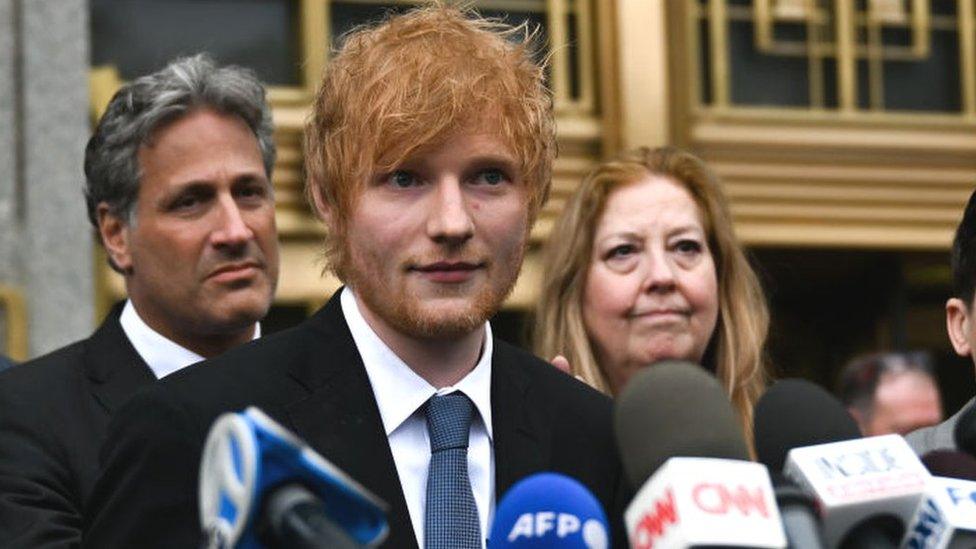Ed Sheeran wins court case over his song Thinking Out Loud
- Published
- comments

Singer Ed Sheeran did not copy Marvin Gaye's song Let's Get It On when writing his own song Thinking Out Loud, a US court has ruled.
Ed was taken to court and accused of copyright infringement - which means breaking a type of legal protection that stops people from copying things - by a company called Structured Asset Sales, who partly own the track that they said had been copied.
They claimed that parts of Ed's song had been "copied and exploited, without authorisation or credit" - meaning that they thought Ed and his co-writer Amy Wadge had taken lots of different parts of Marvin Gaye's older song to use in Thinking Out Loud, without crediting or paying money to Marvin Gaye or his co-writer Ed Townsend.
Ed Sheeran strongly denied this, and said he was "very happy" with the court's decision that he and his friend Amy created his song "independently" - that means on their own, and that it wasn't copied.
Ed Sheeran: I won't have to retire from my day job after all
Before the trial in New York began Sheeran had said he would give up his music career if found guilty "If that happens, I'm done, I'm stopping," he said.
Speaking outside after the trial, Sheeran said "It looks like I'm not going to have to retire from my day job after all.
"But at the same time I am absolutely frustrated that baseless claims like this are allowed to go to court at all." he said.
"If the jury had decided this matter the other way we might as well say goodbye to the creative freedom of songwriters.
"I am not and will never allow myself to be a piggy bank for anyone to shake," he added.
An original piece of work like a song, a picture or even a dance can be covered by a copyright law. A copyright law is designed to protect a piece of work from being copied. You can find out more about copyright here.
During the trial Ed Sheeran sang and played parts of Thinking Out Loud on the guitar for the court to hear.
He said he wrote the song at home in England with his friend Amy Wadge, and had been inspired by his grandparents and a new romantic relationship he had just begun.
A musicologist - someone who studies music - who was defending Ed, told the court that the four-chord sequence used in Ed's song - was also used in several other songs before Marvin Gaye's hit song came out in 1973.
"These are basic musical building blocks that songwriters now and forever must be free to use, or all of us who love music will be poorer for it," said Sheeran's lawyer, Ilene Farkas.
Best-selling singer-songwriter Marvin Gaye is one of the writers of the track that Ed Sheeran is accused of copying
During the trial, Keisha Rice, who represented Structured Asset Sales, said her clients were not claiming to own basic musical elements but instead "the way in which these common elements were uniquely combined".
She asked the court to use their "common sense" to decide whether the songs are similar.
In 2015 Marvin Gaye's family won $5.3m from a lawsuit which said that the Robin Thicke and Pharrell Williams song Blurred Lines copied Gaye's Got to Give It Up.
Last year Sheeran won a copyright battle in London over his song Shape of You.
- Published30 September 2022
- Published4 October 2022
